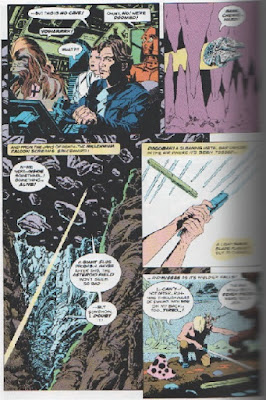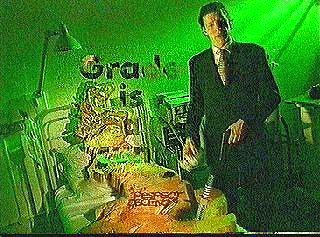This is a sequel to a previous blog post of mine from November 2016. The same criteria for selection applies here as before - as much as I would like to nominate all the main actors who starred in Blakes 7, it seems unlikely that they would have the profile to have been cast as a Number 2 when The Prisoner was being made over 10 years earlier... or would they?
In ascending order, here are 10 more actors who could have (maybe even should have) played Number 2 for an episode of The Prisoner. Any and all of whom would have made a better go of it than John "A Change of Mind" Sharp, as low a bar as that is.
#10. William Hartnell
William Hartnell was much more than just the first Doctor, he was a legitimate character actor of theatre and film. He left Doctor Who in October 1966 and sought other acting parts, and a villainous role in The Prisoner could have been just what he needed to shake off the spectre of typecasting. In reality, of course, he had few TV roles after 1966 due to his declining health, which is why I don't place him higher up this list.
#9. Alan Badel
Star of the BBC's astoundingly good 1964 adaptation of The Count of Monte Cristo, Alan Badel is probably best known as the Minister of the Interior in the 1973 film Dave the Jackal. He would have made a wonderful Number 2, but places low on this list only for the same reason as Anthony Hopkins did in my first list - he would have been better used as the faux-Number 6 in Do Not Forsake Me Oh My Darling. Better than Nigel Stock was, anyhow.
#8. Oliver Reed
Oliver Reed was already a film star by the late 1960s, but it is not impossible that he could have been lured to play a TV role opposite Patrick McGoohan, as he did make a pawful of guest appearances in another telefantasy series, The Saint. A couple of his greatest film roles came around this time - Bill Sykes in Oliver! (1968) and Ivan Dragomiloff in The Assassination Bureau (1969) - so hopefully he could have fitted The Prisoner into his schedule without us having to miss out on either of those.
#7. Robert Vaughn
I had David McCallum highly placed on my earlier list, so perhaps his Man From UNCLE co-star would also have made a good Number 2?
But wait, you know who would have been even better? Not Robert Vaughn, but Peter Vaughan.
The new #7. Peter Vaughan
Peter "Denethor" Vaughan had a long acting career, although he is probably still best known for playing Grouty in Porridge (1974-79). While he was rarely cast in leading role, in 1969 he did star in the series The Gold Robbers as main character DCS Craddock, so I think it reasonable to say his profile around that time may have been such that he could have been a Number 2.
#6. Earl Cameron
Aside from being in Danger Man no less than five times, Earl Cameron was already in The Prisoner, as the Supervisor in The Schizoid Man. Surely only a small step from there to the big round chair...
#5. Bernard Lee
While Bernard Lee was, of course, M in the James Bond films throughout the 1960s and '70s, he was also still making regular appearances on television and was frequently being cast in spy series, having been in an episode of Espionage in 1964, then two episodes of Danger Man with Patrick McGoohan, and then an episode of Man in a Suitcase (playing very much against his 'M'-type as a down-at-heel has-been trying to recapture some of his lost glory) at around the time The Prisoner was being made.
Seeing Bernard Lee in the position of Number 2 would have immediately drawn the audience into making associations with M and Bond, which could have made for a very interesting episode - is this M himself W-wording for the Village?
#4. Burt Kwouk
'You know, Harry, when I was in The Prisoner...'
Another face familiar from the Bond films of the '60s (and about a thousand other things besides) is Burt Kwouk. Having been in Danger Man three times, including the penultimate episode before McGoohan resigned, it's easy to imagine him being cast in The Prisoner, but whether the culture of the times would have permitted him to have such a significant part as Number 2 is another matter, sadly.
Personally, I'd like to hope that they could have been progressive enough to not only cast Burt Kwouk as Number 2, but in an episode that made no reference to his race or with any hint of the 'Yellow Peril' nonsense that was all too common in the 1960s, and for quite a while afterwards as well.
#3. Vladek Sheybal
Yet another actor familiar from Danger Man and James Bond is Vladek "Kronstein" Sheybal, although a better guide to how he might have played Number 2 in a different and interesting way can be found in his portrayal of psychiatrist Dr Jackson in UFO - particularly in earlier episodes such as Exposed where he is an enigmatic and even sinister outsider figure, before he settled into the more comfortable role of SHADO's pet mad scientist.
#2. Julian Glover
Long before he would go on to be the Bond villain Kristatos in For Your Eyes Only, or even his memorable turn as Scaroth, last of the Jagaroth, in Doctor Who's City of Death... In the late '60s Julian Glover was something of a telefantasy rent-a-baddy, with four appearances in The Avengers between 1965 and 1969, plus The Saint and The Champions on top of that.
With that in mind, how he managed to entirely avoid appearing alongside Patrick McGoohan in Danger Man or The Prisoner is something of a mystery, but there's no doubt in my mind that his brand of smooth villainy (as perfected by him by the time of Indiana Jones and the Last Crusade) would have made him ideal for Number 2.
#1. Jacqueline Pearce
Supreme Commander Servalan herself!
Until quite recently (guess what prompted this article?) I was under the impression that Jacqueline Pearce's TV roles in the 1960s were limited to small bit-parts, such as her earliest screen credit on her IMDB page "Jeannie" in the 1964 episode of Danger Man Don't Nail Him Yet, or the part of Marianne in 1966's Avengers episode A Sense of History.
That was until I watched the episode of Man in a Suitcase called Somebody Loses, Somebody... Wins? This was first broadcast in early 1968 (so must have been filmed in 1967), in between the premiere showings of Once Upon a Time and Fall Out. In a plot very obviously influenced by John le Carré's The Spy Who Came in from the Cold, Jacqueline Pearce plays Ruth Klinger, a British double-agent in East Germany with a complicated history between her and the main character McGill (Richard Bradford). In order to preserve her cover with the East German police, Ruth is required to betray McGill.
After McGill himself (the only regular character in the series), Ruth is the second main character for the episode, and Pearce is wonderful in it - far more than just a romantic sidekick for McGill. Quite apart from looking almost exactly like she would when she first played Servalan 10 years later, some of the same mannerisms were already observable (see picture above). A treat for any Blakes 7 fan, but also proof - if proof be need be - that Jacqueline Pearce could easily have made a success of being Number 2 in The Prisoner.


























































